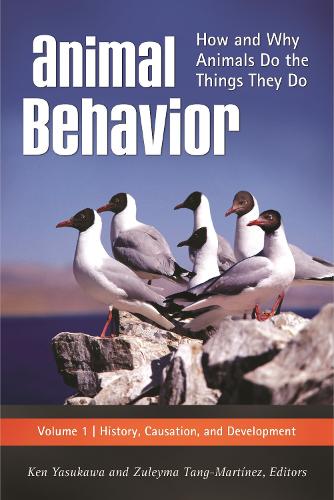
Animal Behavior: How and Why Animals Do the Things They Do [3 volumes]
Publishing Details
Animal Behavior: How and Why Animals Do the Things They Do [3 volumes]
By (Author) Ken Yasukawa
Bloomsbury Publishing PLC
Praeger Publishers Inc
22nd January 2014
United States
Classifications
Tertiary Education
Non Fiction
591.5
Physical Properties
Contains 3 hardbacks
1235
2410g
Description
Discover why animals do what they do, based on their genes, physiologies, cultures, traditions, survival and mating advantages, and evolutionary historiesand find out how studying behavior in the animal world helps us understand human behavior. The three volumes of Animal Behavior: How and Why Animals Do the Things They Do cover the breadth of the field, addressing causation, development, function, and evolution in a wide range of animals, from invertebrates to humans. Inspired by Nobel laureate Nikolaas Tinbergen's work, the first two volumes follow Tinbergen's four classic questions of animal behavior, while the third volume supplies integrated examples of Tinbergen's investigative process applied in specific cases. Written in an engaging, accessible manner ideal for college students as well as general audiences, this evidence-based collection provides a fascinating tour of animal behaviorists' findings, such as how animal communication can be truthful or deceitful, the deadly serious business behind clashes in the "battle of the sexes," and how documentation of animal behavior can lead to a deeper understanding of human behavior. Each chapter provides both historical background and information about current developments in animal behavior knowledge.
Reviews
A notable strength of the entire collection is that the contributors try to explain not just what is currently understood about their topic, but also why they are interested in it and how they go about asking and answering the questions they raise. This set should be part of all academic libraries. Highly recommended. * Choice *
Author Bio
Ken Yasukawa, PhD, is Mead Family Professor of science and professor of biology at Beloit College, WI. He holds a doctorate in zoology from Indiana University and was a postdoctoral fellow at The Rockefeller University Field Research Center.
